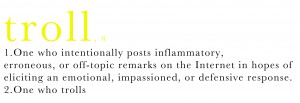Online Trolling Sparks Controversy

"Daruma" trolled the popular online flirting site, LikeALittle.com. He wears a troll mask to illustrate the act of online trolling. Photo by Diego Flores, Tamir Kalifa
By Julie Chang
For Reporting Texas
When a UT government student came upon the popular flirting website LikeALittle.com a few months ago, he said he felt “disgusted.” He found the site’s collection of anonymous flirts describing the physical traits of fellow UT students offensive and an invasion of privacy. To express his displeasure, he started to “troll” the website with pornographic images.
 “I started posting fake flirts on the website with links that would lead to nasty images,” said Daruma, who preferred to use his online pseudonym because his online vandalism might open him to disciplinary action and harm his reputation as a troll.
“I started posting fake flirts on the website with links that would lead to nasty images,” said Daruma, who preferred to use his online pseudonym because his online vandalism might open him to disciplinary action and harm his reputation as a troll.
Although he believes that trolling can be a form of online activism, he acknowledges not all agree with his stance.
“I disagreed on a fundamental level with what that website was doing,” he said. “[It] was very disturbing, and I thought it was very harmful on a campus like this.”
Daruma belongs to an online community known as “trolls.” Trolls, who headquarter on popular online forums like SomethingAwful.com and 4chan.org, post provocative comments or images on other websites to elicit a reaction from visitors. The act of trolling is often meant to draw laughs or as a means of social commentary. For Daruma, his posting of pornographic images onto LikeALittle was the latter.
“I didn’t want people visiting the site,” said Daruma. “As long as I stopped people from using LikeALittle, then mission accomplished. Trolling is meant to expose people’s hypocrisy, help people find justice where there is no justice, or it’s just done for fun.”
If trolls feel like they’ve elicited their desired response, they will post a graphic of a troll face usually on the website they have attacked. Since Daruma’s trolling of LikeALittle, the website has stopped allowing visitors to post active hyperlinks. LikeALittle has also experienced a decline in users, according to Wesley Williams, a manager of UT’s branch of the site.
Williams, who screens posted flirts for offensive content, did not find the images amusing.
“I think it was a little immature… and he could’ve gone about that differently,” Williams said. “If you’re not fond of that website, you don’t have to go on it. I don’t see how or why posting pornographic images gets his point across.”
Daruma said trolls started out in the 1990s by writing viruses that targeted online users, sometimes in the form of pop-ups. They later convened on private online forums that would “bait” online users to “make fools of themselves.”
Although the number of global trolls is likely in the thousands, their secretive and inconsistent activities make them difficult to track. Still, they frequently surface to take part in more public activities.

- Trolling to uphold her beliefs, “TT” wears the troll face mask that, like her user name, provides anonymity. Photo by Diego Flores, Tamir Kalifa
Although Herber doubts the city will side with the trolls on the new name, Fred Durst himself tweeted earlier this month that he hopes that his namesake wins.
But not all trolling is meant to be lighthearted or a form of social commentary. Patch.com recently reported that a Facebook memorial site of a teen killed in a car accident was trolled with “over 200 images of pornography and graphic violence.”
Earlier last month, another Facebook memorial page for a Kansas teen received a comment that read, “I wish Travis had suffered more … I would have laughed,” according to a report from KCTV 5 News in Kansas City.
Daruma said that trolling memorial pages said isn’t true trolling.
Trolling is not meant to be malicious, but an exercise in free speech, he said, adding that trolls oppose violence toward people and animals. Daruma said he believes that trolls are unfairly portrayed in the media and that genuine trolls work to eliminate mean and humorless posts.

- Vincent Cicchirillo’s research focuses on cyberbullying, but he sees a distinct difference in trolling. Photo by Diego Flores, Tamir Kalifa
UT professor Vincent Cicchirillo, who has published on cyberbullying, said that both cyberbullies and trolls gain a sense of power from dominating another individual over the Internet. But the victims and intentions of cyberbullying and trolling differ, making cyberbullying far more serious.
Cyberbullies harass individuals in an attempt to cause psychological harm whereas most trolls target groups and organizations to generate conflict for entertainment, according to Cicchirillo.
“Since trolling harasses groups, you have a way to reduce that impact because it’s on a group of people who can support each other,” said Cicchirillo. “Whereas cyberbullying is individual-based and the victim feels alone. So the impacts could be more hurtful.”
Even so, Daruma said he doesn’t troll anymore. He doesn’t have the time. But, he said if the occasion ever calls for it, he wouldn’t mind donning the troll face again.
“If it was something that I really disagreed with on a fundamental level, then I would do it again,” said Daruma. “Definitely.”